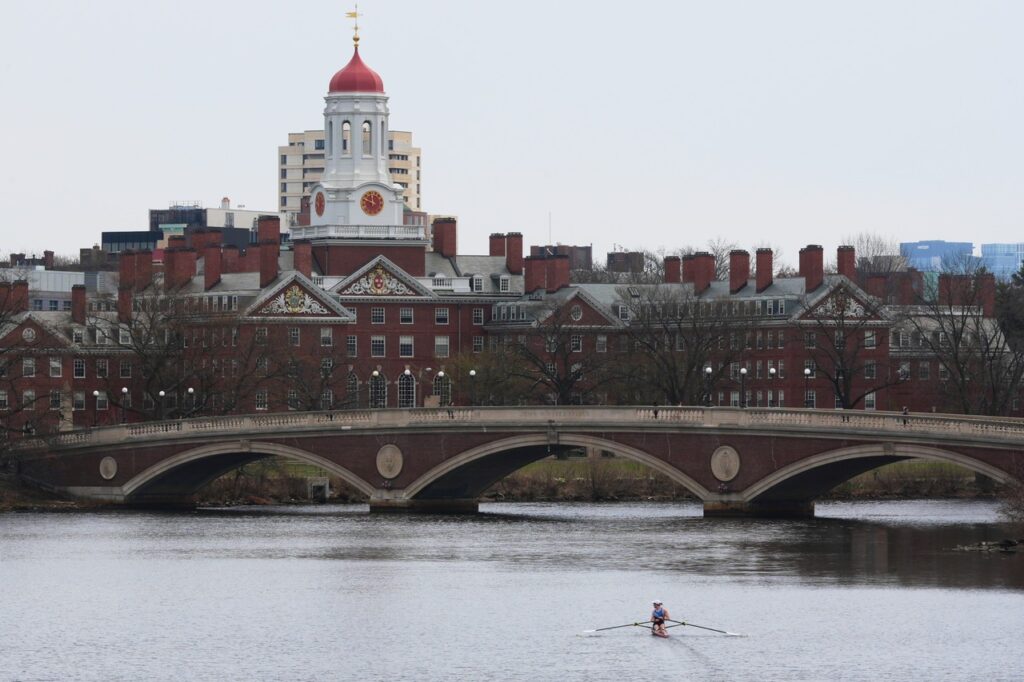As a mounting list of executive orders and federal actions has been waged against higher education, some Massachusetts lawmakers aim to tax colleges that prioritize legacy applicants, children of donors or offer early decision.
The bill, which was discussed during a hearing at the Joint Committee on Higher Education on Monday, would make those institutions pay a public service fee to fund state institutions based on their endowment size.
That would force institutions like Harvard University to contribute over $106 million, Amherst College to contribute $8.6 million, Williams College to contribute $5.6 million and Wellesley College to contribute $4.5 million, among others.
The Massachusetts Institute of Technology and the University of Massachusetts Amherst wouldn’t be taxed because they don’t use the admissions practices.
‘Daily chaos’
During the hearing, Brad Freeman, vice president of government relations for the Association of Independent Colleges and Universities in Massachusetts, raised concerns about the bill, especially given the current challenges higher education is facing.
“As Massachusetts prepares for demographic changes and economic headwinds along with daily chaos… from D.C., it would be harmful to prohibit colleges and universities from utilizing proven admissions processes such as early decision, which allows campuses to begin building out their classes with students who are passionate about joining that community,” Freeman said.
“The banning of this admissions tool, which enrolls students ranging from Pell-eligible students with a hundred percent financial need. To full-pay students would make Massachusetts the only state in the country with such a policy and put to commonwealth our colleges and universities, our students and parents at an enormous disadvantage,” Freeman said.
The bill comes at a time where President Donald Trump is threatening to strip Harvard’s tax-exempt status, barring the institution from receiving new federal grants and threatening to take away federal funding from many higher education institutions.
‘Principles of fairness’
In a statement to MassLive, state Rep. Simon Cataldo, D-14th Middlesex, said the admissions practices are wrong regardless of who the president is.
“Meaningful admissions reform in higher education must transcend political cycles — ensuring basic principles of fairness and merit remain steadfast priorities, no matter who occupies the White House. The pernicious practices of donor-based, legacy and binding early decision admission were wrong when we first introduced this bill in January 2023, and remain wrong in our current higher education landscape,” Cataldo said.
Sen. Pavel Payano, D-1st Essex, who also sponsored the bill, agreed, stating that “students from communities like mine cannot afford to wait.”
“By ending legacy, donor and binding early decision preferences and directing the resulting contributions to our community and state colleges, Massachusetts can show the college admission process is based solely on the merit of the applicant. This bill gives every hardworking student applying to school in the Commonwealth a fair shot based solely on what their achievements,” Payano said.
However, Freeman said the decision to seek early admission is a choice families should make, not legislators. The tax is “punitive” and ultimately will drive students away rather than attract them to Massachusetts, he said.
“Higher education is facing a crisis in Washington and I urge the committee to not add to the regulatory and financial burden that is ascending on our sector,” he said.
Solutions independent of the law
In response to Freeman’s comments, Payano asked Freeman during the hearing how he’d address concerns that early decision might disadvantage students from low-income backgrounds and Black and Brown communities who can’t commit without being able to compare financial aid offers.
“It creates, I think, a difficult situation when you see individuals that are getting in — it looks like there [are] seats for individuals that have wealth,” Payano said.
Freeman said he has heard from institutions that Pell-eligible students are represented in both early decision and regular decision and that institutions have gone need-blind or are meeting the full need of students from families with a certain income level.
For instance, Harvard University announced that it will cover tuition for families that earn $200,000 or less and will cover tuition, food, housing, health insurance and travel costs for families with annual incomes of $100,000 or less.
Read more: Why are more Mass. colleges and universities offering tuition-free programs?
The legislation has been discussed for a couple of years now. In 2023, Cataldo and Payano introduced the bill, entitled “An Act to advance fairness, integrity, and excellence in higher education admissions.”
Both Cataldo and Payano filed the bill in anticipation of the recent U.S. Supreme Court decision that struck down the use of affirmative action in college admissions, according to past reporting from MassLive.
In addition to taxing institutions based on admissions practices, the bill requires colleges and universities to share admissions data, such as the number of legacy students admitted. The information would then be shared publicly to the office of the Attorney General and the state’s Department of Higher Education.
Other legislation
Other bills were also discussed during the hearing, which focused on eliminating legacy admissions from colleges and universities in Massachusetts.
One of those bills is sponsored by Sen. Lydia Edwards, D-3rd Suffolk, and state Rep. Michael Moran, D-18th Suffolk, entitled “An Act banning legacy preferences in higher education.” The ban would be in both private and public institutions.
California, Illinois, Maryland, Virginia and Colorado have all banned legacy admissions in part or all of their institutions. Four-year institutions that consider legacy in admissions has plummeted from 49% in 2015 to 24%, according to a report from Education Reform Now.
Several students, legislators and organizers spoke to the importance of getting rid of legacy admissions in Massachusetts during the hearing.
“When I talk to my classmates from these very wealthy backgrounds, I find it shocking how many of them knew that Harvard would be their school because of their legacy status,” said Maddie Register, a first year at Harvard.


